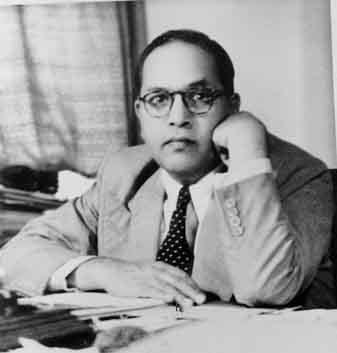
The caste system has survived for about 1,500 years in Indian culture. The ranks of Hindu society originate, according to legend, from the main groups, or varnas, that emerged from a primordial being. From the mouth, emerged the Brahmans- the priests or teachers. The arms of the being became the Kshatriyas- the rulers and soldiers. The thighs became the Vaisyas- merchants and traders. Lastly, the laborers, or Sudras came from the feet of the being. The Untouchables, or Dalits (or Achutas, or Mahars), make up a fifth group that the primordial being does not claim. They literally do not belong to the general body of humanity in Hindu belief.
The Untouchables, to this day, perform the work that Indians consider 'unclean'. Usually this means any work that requires contact with blood, excrement, and other bodily 'defilements', as defined by Hindu law. Most aspects of daily life and behavior are set down in the Law of Manu, a text compiled 2,000 years ago by Brahman priests. The caste system is formally outlawed in India; since 80% of Indians are Hindus, it still persists.
Mahatma Gandhi (a Vaisya) naturally opposed the situation for Untouchables, without taking the natural next step of opposing caste itself. He rechristened them "Harijans" or "children of God" and toured the subcontinent in 1933 agitating for their rights. He also adopted an Untouchable daughter. However, Untouchables note that Gandhi ultimately upheld the orthodoxy of the caste system.
Bhimo Ramji Ambedkar: (Pictured) Untouchable hero, who drafted the Indian constitution, wrote several books, and founded the first Untouchable political party. He was outspoken and controversial; in one case, burning a copy of The Laws of Manu during a public protest. Unlike Gandhi, Ambedhar felt that the religious underpinnings of civil life in India should be done away with. Gandhi objected on religious grounds. For some time, the relative merits of Ambedkar versus Gandhi were debated in India.
Things have improved greatly for Untouchables since the days that they could be beaten to death for touching a higher caste member (or casting a shadow upon them in some cases). Today they are represented in the Indian Parliament and in equal opportunity laws. However, they are still socially separated, shunned, relegated to 'unclean' work, and often attacked for openly defying the caste system. Violence against Dalits is still common. The Untouchable status has been called the strongest racist structure in the modern world. Without taking account of skin color or genetics, the status brands millions of Indians as lower than the rest of humanity from birth. The status, and the caste system itself, has no place in the modern world.
3 comments:
Just as there is no clear justification of the subjugation of women in the Koran, there is no clear justification for the caste system in the Hindu scriptures.
Furthermore, castes were not always as rigid as they had become in Gandhi's time. Also, the British during their colonial rule had a role in the rigidification (is that a word) of the caste system, and they had a hand in establishing the privileges of the upper castes, since those people were their allies.
I'd say that your statement hinges on the word 'clear'. The caste system is layed out in great detail in the Laws of Manu, and the several hundred subcastes were fully elaborated by the time the Delhi sultanate was established. Moreover, since the days of Brahmanism, caste has been inviolable in a historical lifetime, which I consider to be rigid enough. The British certainly played into this, but the precedent was there before the Sultanate.
I'm familiar with the argument in postcolonial studies that the British helped create Hinduism, but it seems to me to rely heavily on speculation. We don't know how people behaved before the Muslim reign because all of the texts that we have are religious scriptures. Should we read them literally? Probably not. But, the postcolonial argument seems to boil down to wishful thinking that they wrote those things, but they didn't really mean them.
The troubling passages of the Koran- most of which are in the Surat An-Nisa- can be chalked up to having been written in the 7th century, and easily relegated to the past, along with the troubling passages in every religious text in world history. A fundamentalist reading cannot do this, but most Muslims have no problem doing so.
In other words, the troubling sections of the Koran and the Hindu scriptures are clear enough for me- the question is in how we choose to read them. It's quite possible to see religions as evolving and changing over time; just not for fundamentalists.
I read once that castes were originally intended to not be assigned by birth, but by character and ability. I don't know if that is true or not, that sounds like another example of wishful thinking to me.
But the Bhagavad-Gita delves somewhat into the system, when Krishna tells Arjuna that it is his duty as a Ksatriya to engage in warfare against the sons of Pandara. It was explained to Arjuna that this was his birthright, and to turn from it would be a grave sin.
In fact, Arjuna's reluctance to fight in this war, and Khrihna's urgings for him to do so based on this reasoning, sets up the entire framework of the Gita.
Arjuna could have just as easily have been a garbage collector, complaining about having to come into contact with other peoples refuse and defecations, and the same point could have been made. It would not have been as romantic or exciting, but it still would have been the same thing.
This obviously also proves that Arjuna, who was actually heartsick at the prospect of killing friends and relatives that he knew that fought on the other side, was expected to do it anyway. It was his place to do so.
Post a Comment